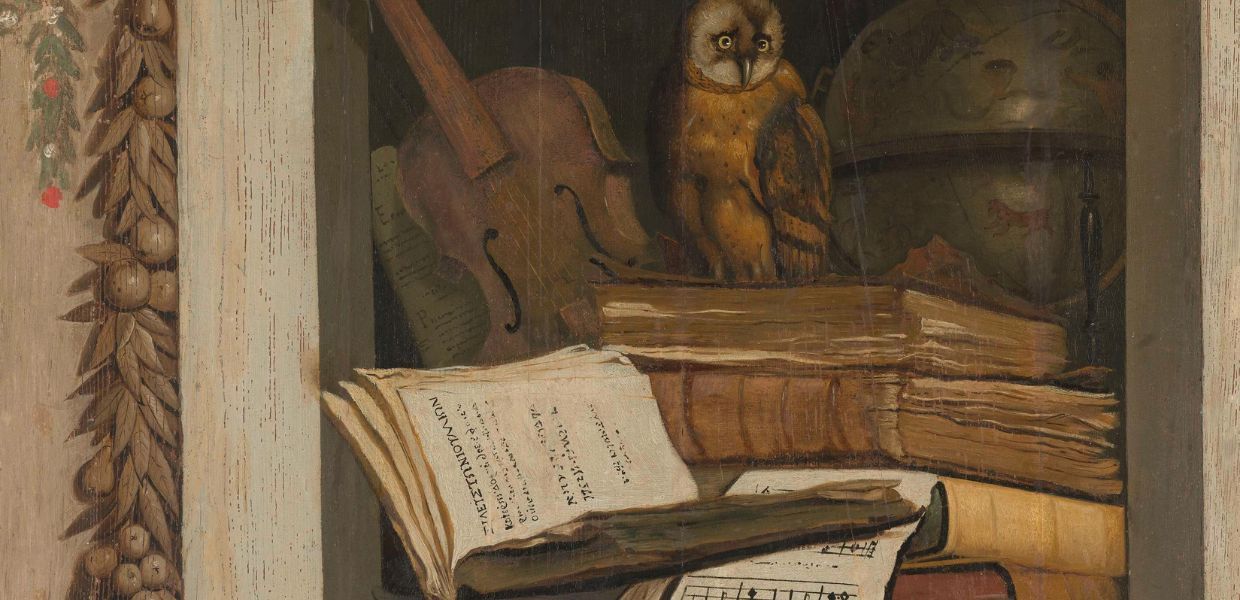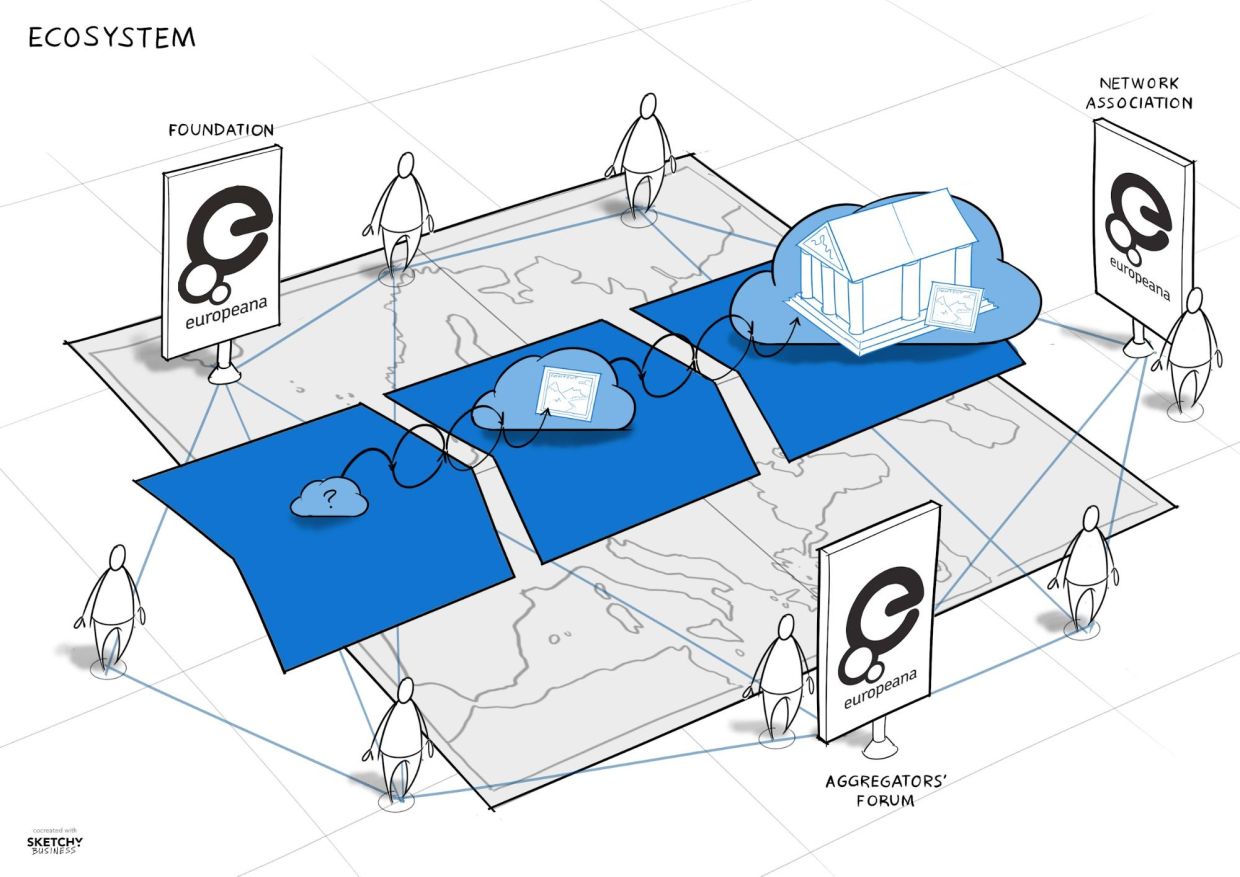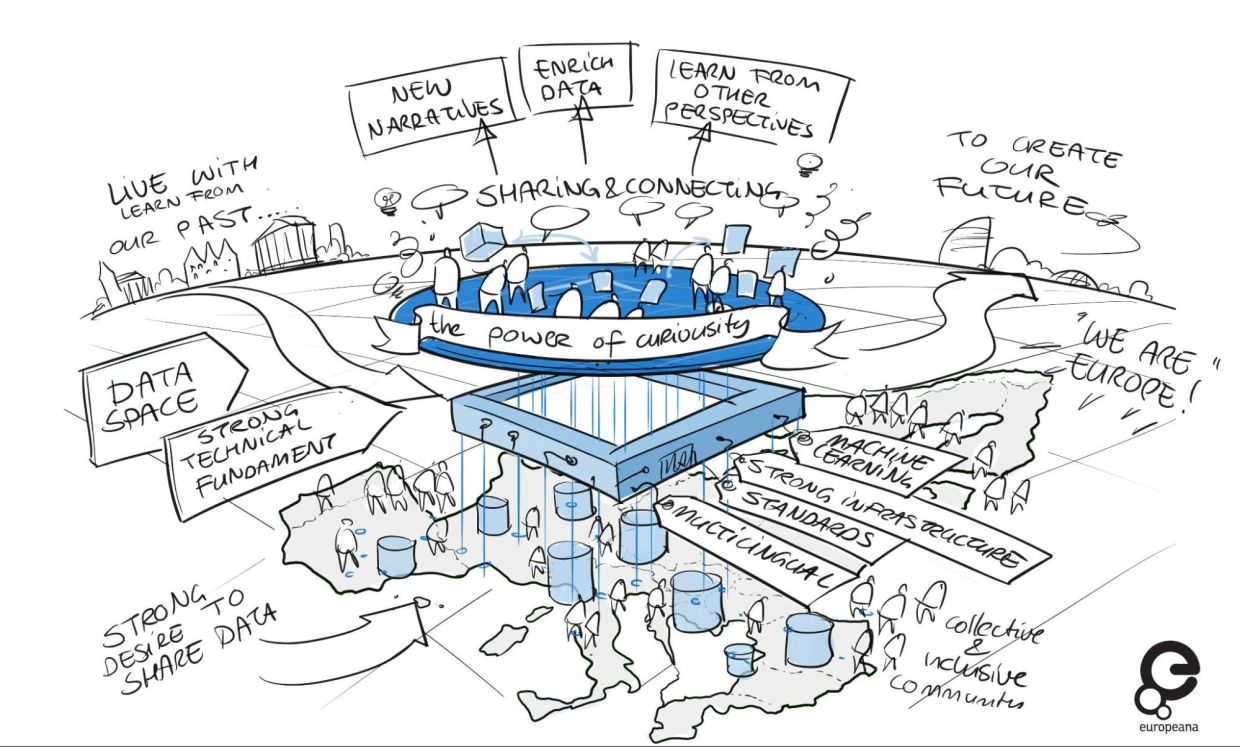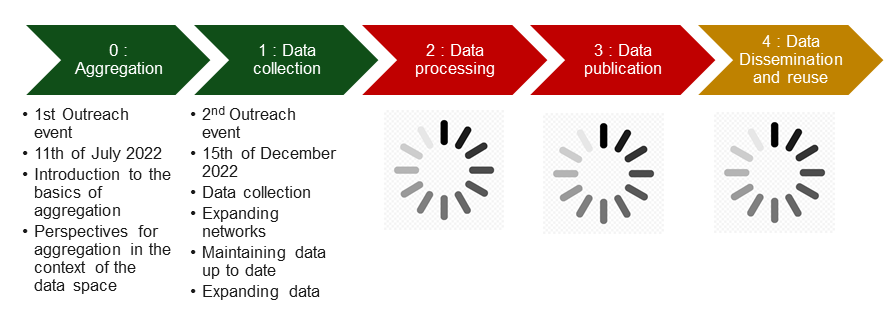Accreditation
The EAF has an established accreditation process in order to accept new members. New applications for accreditation are evaluated by the EAF Steering Group and approved by the General Assembly of the EAF during the two EAF meetings in spring and autumn of each year.
No new aggregator has received accreditation in 2022, but we see a number of new aggregators emerging. Arts Council Norway has finalised the process to bring back the data from Norwegian museums via the DigitalMuseum infrastructure. Slovakiana and Catalònica have made good progress to establish infrastructure and processes to deliver data to Europeana. With the impulse of the EC Recommendation and the funding possibilities from the Resilience and Recovery Facility, some new aggregators are in the making. These promising activities should lead to a growth of the EAF over the coming years.
EAF Steering Group meetings
The EAF Steering Group aims to meet about once a month and has held a total of 10 meetings in 2022. These meetings saw the preparation of the bi-annual EAF meetings and the preparation of the two EAF outreach events.
Europeana Initiative wide aspects have also been dealt with during Steering Group meetings, including the alignment of activities with the ENA Management Board.
Members of the Steering Group are Marie-Véronique Leroi (Chair), Kerstin Herlt (Vice-Chair), Nicole Emmenegger and Henning Scholz.
EAF meetings
The EAF held its spring meeting on 4 - 5 April in collaboration with EF and the Netherlands Institute for Sound and Vision. It was a hybrid event with 32 participants (including EF staff) attending the event in Hilversum and 55 colleagues joining online. Out of the 40 accredited aggregators, 35 were represented with one or more colleagues during the meeting.
On day one, we had the EAF General Assembly, followed by a session on making Out-of-commerce Works available online. We had updates from the Aggregators’ User Group, the Digital Transformation Task Force and the Enumerate Survey. Participants also discussed how the EAF and its members can support CHIs in Ukraine. Day two was focussed entirely on the development of the common European data space for cultural heritage and the role of the EAF. In a series of workshops, we discussed different scenarios for how aggregators can contribute to its development.
On 18-19 October, the Europeana Aggregators’ Forum (EAF) got together for a hybrid meeting to celebrate its 10th anniversary. In total, 56 aggregator representatives joined the meeting, 19 of them in the EF office in the National Library of The Netherlands. 31 out of the 40 accredited aggregators attended and contributed to the meeting. The core topic was the development of the common European data space for cultural heritage, in order to raise awareness of the EC recommendation and discuss needs and next steps for aggregators. In that context we also focussed on concrete outcomes of the implementation plan that have an impact for the work of the aggregators, e.g. working with the Metis Sandbox and developing dissemination activities for data and content. Since work has been done on diversity, equity and inclusion by DSI aggregators last year, the EAF meeting provided the stage to also share the Recommendations for identifying and managing diversity in cultural heritage data with national aggregators and start the discussion on this important topic on the EAF level.
EAF outreach events
In 2022 we started a series of outreach events, for aggregators to engage with the cultural heritage sector, the European Commission and important stakeholders. The first outreach event took place on 11 July 2022 and it was held online. The purpose of the outreach event was to raise the visibility of aggregators and the aggregation workflow, and to consider the challenges and opportunities regarding aggregation in the context of the data space. With this event, the EAF went back to the basics of aggregation in terms of technical processes and organisation. The agenda and more information are available on Europeana Pro. This first introductory event was open to all stakeholders involved in the Europeana Initiative and the upcoming common European data space for cultural heritage. We had 129 participants from 34 countries (including 23 EU Member States) across all stakeholders and concluded with a satisfaction rate of 84% with the event.
With the following four events we plan to introduce the main phases that are essential for content and data aggregation. At the second outreach event on 15 December, we invited aggregators to share their experiences in collecting new content and maintaining data up-to-date; we also discussed how established processes and workflows might change in the context of the common European data space for cultural heritage. We had 92 participants across all the stakeholders and concluded with a satisfaction rate of 70% with the event.
For both events, the EAF Steering Group invited representatives from DG Connect to introduce the EU’s digital policy for cultural heritage and to answer questions from the audience on the data space.
EAF Task Forces and Working Groups
Aggregators User Group
The Aggregators’ User Group was set up in 2020 to provide and channel feedback to the EF on its range of products (including the Europeana website, Metis and the Europeana Pro website). The group met seven times in 2022. The agenda included: multilinguality, the development of the aggregation strategy, the development of the entity flow feature of the Europeana website, and the further development of Europeana Pro.
Data Quality Committee
The Data Quality Committee (DQC) is a EuropeanaTech working group, where the EAF is represented by a number of active members. It is a standing committee that works on the various facets of data quality with a particular focus on reuse and discovery of cultural heritage objects. Over the course of last year, it contributed, for example, to the work on problem patterns and the requirements to implement more detailed data quality reports to the Metis Sandbox.
IIIF and Europeana Working Group
The IIIF and Europeana Working Group was first proposed at the autumn 2019 EAF meeting and started work in 2020 with a series of training workshops. In 2022, the working group organised a training session for aggregators to get started with IIIF and prepared training materials. The goal of the training was for people to create a IIIF manifest and an EDM record, and to preview the result in the Metis Sandbox. The working group has reviewed its membership and now consolidated on a group that will focus on another training session to support aggregators scaling the work with IIIF.
Libraries Working Group
The idea to set up a Libraries Working Group (LWG) under the EAF was proposed in 2020. The LWG was launched in May 2022 to support (national) libraries to engage with the Europeana Initiative. Since then, we have started to engage with several libraries, but tangible results of this are not available. After the end of The European Library, it still takes some time for the libraries to focus on a new relationship with the Europeana Initiative.
SOLID-based Decentralised Aggregation Task Force
This Task Force (run by the EAF) studies the feasibility of moving forward to decentralised (e.g. SOLID-based) aggregation. It will look at technological alternatives to decentralisation and the issues accompanying a possible transition to a new form of aggregation especially in terms of governance and organisation. This Task Force is complementary to the Linked Data Task Force led within the ENA EuropeanaTech community.
Digital Transformation Task Force
In September 2021 the Europeana Initiative set up a Digital Transformation Task Force. The Task Force ran until March 2022 with an aim to build capacity for digital transformation, and produced an action plan as a unified approach for adoption across Europeana Initiative stakeholders. Kerstin Arnold and Chiara Latronico represented the EAF on this Task Force.
Diversity and inclusion Task Force and DSI aggregator’s working group
The Diversity and Inclusion Task Force, active throughout 2022, developed and managed a consultation on behalf of the Europeana Initiative to address diversity and inclusion across its operation. It was a joint Task Force from the EF, the ENA and the EAF. Valentina Bachi and Julia Welter represented the EAF on this Task Force.
In the context of the DSI-4 project, the Aggregators Working Group (WG) with participants from EUScreen (NISV), European Film Gateway (DFF), Photoconsortium, MUSEU (MCA), OpenUp! (AIT-Graz), Archives Portal Europe (APEF), European Fashion Heritage Association (EFHA) and Europeana Sounds (BL) explored this theme and the specific challenges related to aggregation and working with content providers. The group concluded their work in August 2022 and produced a Case studies report and Recommendations on “Identifying and managing diversity in cultural heritage data.
EAF collaboration with ENA and the Europeana Foundation
Joint meetings
The three Europeana Initiative pillars have been regularly working together to make sure their priorities and actions are aligned and carried out in a concerted effort. Throughout 2022, representatives of the EAF Steering Group, the EF senior management team and the ENA Management Board met on a monthly basis to discuss issues of common interest and strategic importance.
EAF’s role in cross-Europeana Initiative Task Forces and Working Groups
The closer alignment of the three Initiative pillars is also reflected in the launch of several cross-Initiative Task Forces, which allow us to optimise performance and our individual and collective actions across the Initiative (see above).
The supporting the digital cultural heritage of Ukraine Working Group aims to support existing initiatives and develop new, concerted actions that respond to the current needs of the Ukrainian digital heritage sector. It is a joint Working Group from the Europeana Initiative and Hélène Bergès, Maria Carlsson, Tetiana Kysla, Margret Plank, Corinne Szteinsznaider are active EAF members in this working group.
The Capacity Building Working Group was founded at the end of 2022 and aims to support the implementation of a capacity building working plan for the common European data space for cultural heritage. Kerstin Arnold, Valentina Bachi, Antonella Fresa and Tom Miles represent the EAF in this group.
Involvement of the EAF Steering Group in EF and Initiative actions
Corinne Szteinsznaider from MUSEU represented the EAF on the Selection and the Programme Committee for the 2022 Europeana Conference.
EAF Communication
The EAF continues to use Basecamp for communication towards and between its members, including separate groups for aggregators who are part of the DSI and the data space consortium. We continue to share public news relevant to aggregators through Europeana Pro, in the ENA newsletter and, where relevant, through social media messages. More targeted messages are sent to promote events and news of interest to aggregators such as announcing new accreditations or funding opportunities.
Interviews with Aggregators
In November 2022, the Steering Group started conducting interviews with all 40 aggregators, to gain a better understanding of topics like:
what was the motivation to become an aggregator for Europeana;
how aggregators are organised in terms of staff and budget;
what kind of services they provide, or would like to develop further;
what are the data quality and data management procedures aggregators have developed on their side and
whether they have any questions regarding the common data space for cultural heritage.
The interviews will be continued in 2023 and summarised in a final internal report.
Outlook to 2023
EAF Steering Group elections
In February 2023, we will run elections to fill two vacancies in the Steering Group. Nicole Emmenegger stepped down to enter a new phase in her professional development, and the three year term for Kerstin Herlt is coming to an end in April 2023. Four EAF members have submitted their candidacies, elections will take place between 8 and 15 February.
Events and meetings
In 2023 we again plan to have a spring and autumn meeting of the EAF. The spring edition will take place online on 4 - 5 April. The autumn edition will take place as a hybrid event, with the physical part in Budapest from 2 - 3 November. It will be organised in collaboration with the Hungarian Aggregators’ Forum, which is an alliance of all of the Hungarian aggregators.
We will also organise two more EAF outreach events. The third event in this event series will be on 15 June and will focus on data processing; the fourth event in the series will be on 23 November and will focus on data publication.







